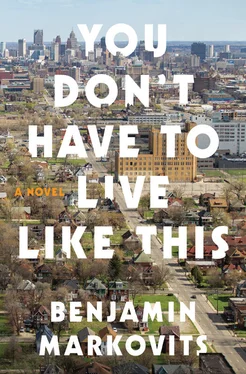“I’m about as warm as I’m gonna get,” Obama said. “Come on, Reggie. Let’s get it on.”
Reggie was his assistant, one of those friendly-faced black guys, about six and a half feet tall, and bald as a cantaloupe. About a foot taller than Bill Russo, who played, too. Bill still kept a set of workout clothes at Robert’s house and was the only one of us in rubber soles — he had on his wrestling shoes and started grabbing people by the waist and pushing.
“Get off me, Bill,” Robert said.
But Bill was having a good time; he didn’t give a shit about basketball. He guarded Robert, and Reggie guarded Sam, and the president guarded me. Mostly I tried to get out of his way. I didn’t want to injure anybody, and the ground was cold concrete and slippery with snow dust. Obama put up a jump shot and missed, and Reggie grabbed the rebound and kicked it back to him, and this time he knocked it down.
“It’s raining on a snowy day,” Obama said. He had a quick, jerky left-handed stroke, which took a little getting used to. After each shot he held his hand out like a claw.
“You got to get on him,” Robert told me.
We played to fifteen and then we played to fifteen again. Sam was still in good shape. His shot was rusty but he was strong and fast and could dribble all over the place; somehow nobody ever got in his way. And Robert had a nice little soft fifteen-footer — a white-boy jump shot, Obama said. I don’t think Reggie tried particularly hard. He picked up a lot of rebounds. We won the first game and then Obama got hot — shooting from the fences, he called it — and they pulled out the second. Obama and Reggie liked to talk. Sam didn’t say a word, and Robert didn’t talk much either; it took me a while to realize he was pissed off. Partly at Bill, who kept horsing around and taking out his legs. But partly at me, too.
“Rubber match?” Obama said, and when the third game started, Robert switched me onto Bill and guarded the president himself.
Afterwards I tried to work out what happened — I wanted to understand the buildup. Maybe it was a racial thing. Robert played varsity basketball for Claremont High. They had one of those teams where the uniforms don’t show your name. The way Robert was brought up, you played hard and you made the extra pass and you didn’t care how many points you scored, you cared about winning. And you didn’t talk. But Obama liked to run his mouth. It didn’t bother me much. But maybe it had nothing to do with basketball, maybe Robert was pissed off about something else.
Anyway, it was cold and people were tired, and still half drunk. I got the feeling on both sides that some guys really wanted to win. Then Reggie set a pick for Obama, and Robert pushed through it. I tried to help out and caught an elbow in the nose from somebody and sat down on the frozen concrete, trying to hold the blood in with my fingers.
Obama put his hand on my head. “You all right, kid?” he said. “Let’s call this thing off.”
But Bill ran in to get toilet paper, which I stuffed in my nose to stop the bleeding.
“Marny’s fine,” Robert said. “You all right, Marny? He’s fine. If you start something you finish it.”
“I don’t mind,” I said. So we finished the game.
Afterwards, I said to the president, “There’s somebody who wants to meet you.”
Gloria was waiting for me in the kitchen, with a wet, warm cloth. I took out the bloody tissue paper and held the cloth to my face. When she saw Obama, she kind of stood at attention, but he put out his hand and she shook it.
“I think you knew my father,” she said. “I think you knew my father before I knew him.”
Obama’s high forehead was sweating under the kitchen lights; he started drying himself off with cocktail napkins. After a while, he had a handful of these napkins and nowhere to put them.
“Who’s your father?”
“Tom Lambert. He used to work for the DCP in Chicago.”
He put the napkins in his pocket. “I was very sorry to hear it when he died.”
“That was a long time ago.”
“Too long,” Obama said. “He died too young.”
“Thank you, Mr. President.”
The kitchen was crowded, there were maybe thirty people in the room, including the caterers, waitstaff, security, and the rest of the guys who played. Obama put his arm around me and said, “I want you to know something about this guy, he’s not a whiner,” and then the other conversations took over. Somebody brought the president a glass of mineral water. He turned to Robert, who was drinking tap water by the sink, and called out, “You ever seen the shower they got on Air Force One?”
“You can use the showers here.”
“If I leave now I can kiss the kids good night.”
The sense I had of unreality was strong. Robert had left his shirt over one of the chairs and put it on again, buttoning it slowly; his fingers were probably cold. He didn’t look very happy — we lost that last game by six or seven points, and I got this funny feeling that Obama was talking so much because he won. But then I couldn’t read him at all. His face was very expressive. Of course, he was used to being looked at, and maybe the best way of covering up what you think is to show a lot of expression. But then at other times his face went blank, he stopped paying attention, and people around him had to repeat their questions. Robert I knew a lot better, but he was strange to me, too, and I wondered if they had been working on some deal that didn’t come off.
Gloria said to me, “Take me home.”
“You ready to go?”
“If you can’t make it with me now, you never gonna make it with me.”
So I took her home.
Gloria was one of those people with a confession to make. I don’t mean confession exactly, but something she has to tell you if you’re going to get to know her. There were probably twenty people she’d told this story to, a couple of high school friends, a few of their parents, one of her teachers, someone from camp, her roommates at Michigan, a few other college friends and most of her boyfriends.
When she was seven years old she learned to ride a bike. Her father used to take her out on Saturday mornings. He worked as a lawyer for the UAW and didn’t see much of Gloria in the week — mostly he got home when she was in the bath. But Saturday morning was Mother’s morning off (on Sunday the whole family went to church), and Gloria could pick whatever she wanted to do with her dad, eat pancakes, go to the zoo. That summer she mostly felt like riding her bike.
Sometimes they rode through Jefferson Chalmers to Lakewood Park and looked at the water, or they rode over to Chandler Park or they went into Grosse Pointe, which started just across the road from their apartment block. Gloria liked to look at the big houses, and the streets of Grosse Pointe are wide and quiet. There isn’t much traffic.
They were biking along Whittier Road one day, just off Charlevoix, when her daddy came off. He just leaned over slowly and the bike leaned with him, and turned to the side, and since there isn’t much of a curb on Whittier he fell into one of those patches of grass between the road and the sidewalk, and lay there next to a tree. She laughed at first, but then she had to turn around and go back to him, because he didn’t get up. The bike was still between his legs, he was still breathing, his eyes were open, but he didn’t do anything or say anything when she shook him or shouted at him. It was about nine in the morning. Even as a kid Gloria liked to get up first thing, and her daddy made her breakfast on Saturdays and sometimes they set off while her mother was still in bed.
For almost an hour she sat by her father in the grass. After a while she even stopped crying. A few cars went by and there was a jogger on the other side of the road, but nobody came out of their houses to see why a little black girl was sitting next to a fifty-five-year-old black man in the grass by the curb with their bikes on the ground. The reason she didn’t knock on anyone’s door to ask for help is because she was scared they weren’t supposed to be there and she didn’t want to get her daddy in trouble.
Читать дальше












